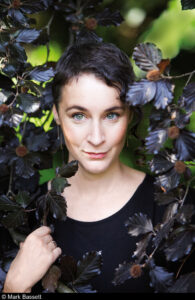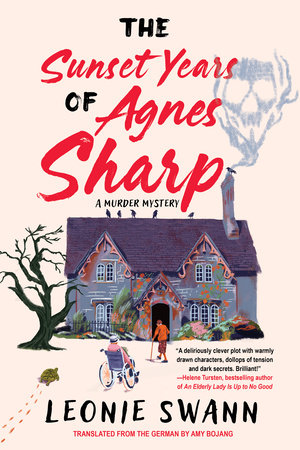TSM: What initially drew you to the thriller, crime, and detective genres? Were there any specific books or authors you read throughout your life that inspired your work or drew you into the genre?
LS: Confession time: I am not really a dedicated fan of the crime genre – not because I do not enjoy a good detective story as much as the next person, but because I don’t really think in genres. There are good books that draw you in with engaging characters, a complex depiction of the world, well-paced storylines and elegant and efficient writing. If I come across such a book, I don’t really worry about the genre, be it fantasy, romance, thriller or otherwise. All the best books are about more than just one thing anyway.
That being said, there are a few aspects that make the mystery genre especially attractive for me as a writer. I like to tell off-the-wall stories with quirky heroes, stories that encourage the reader to experience the world from a slightly different vantage point. Sometimes this can be a bit of a leap of faith, and the familiarity of the crime genre will help the reader to feel comfortable from the very first page. After all, everyone likes a good mystery, and everyone knows how a detective story usually works. This gives me the opportunity to play with the genre, introduce humour, deviate from the beaten path and have a bit of fun – always hoping the reader will have fun too.
 TSM: What has it been like to publish your novels in more than one language? Have there been any challenges or things you feared might be lost in translation? Conversely, has there been anything special or exciting about having books that can reach a wider audience given their publication in multiple languages?
TSM: What has it been like to publish your novels in more than one language? Have there been any challenges or things you feared might be lost in translation? Conversely, has there been anything special or exciting about having books that can reach a wider audience given their publication in multiple languages?
LS: I find it exciting to see my books cross language borders. Some languages, such as Japanese are completely inaccessible to me, even the direction of reading changes and I can’t recognise a single name. But even then, there is a book cover that will tell you something about how the story is perceived.
Other languages – English especially – I am very familiar with. For The Sunset Years of Agnes Sharp, I have been working closely with my lovely translator Amy Bojang. Together we have tried to bring across as much of the tone and spirit of the book as humanly possible. Some things will always be lost in translation – but other things can be found. I try not to worry – languages are fluid, meanings and connotations change all the time anyway. Beyond the words I feel that a good book should have something that is universally human, and it is wonderful to see that a story you have told can touch people all over the world.
TSM: Can you tell us about your upcoming novel, The Sunset Years of Agnes Sharp?
LS: At first glance, The Sunset Years of Agnes Sharp is a classic murder mystery, set in the idyllic English countryside, where a bunch of unconventional pensioners share a house and tackle the challenges of old age together. One day a body turns up in the shed, another one is quickly found on the neighbour’s terrace. The eccentric elderly protagonists are determined to get to the bottom of this sudden onslaught of fatalities.
At second glance, Agnes and her fellow pensioners are far too relaxed about the bodies dropping around them, their methods are unorthodox to the extreme and their priorities can be questionable (Hettie the trusty household tortoise is always one of the number one concerns). Nothing is quite as it seems when Agnes and her gang tackle stairlifts, snobby coffee mornings, the authorities and their deepest fears in a determined bid to find the killer, all the while hiding their own, dark secrets.
TSM: In a world whose stories don’t often include many prominent elderly characters, what inspired you to write a story that revolves around “a quirky group of seniors”?
LS: Curiosity, I suppose. I like to tell stories from an unfamiliar vantage point, something that gives me (and ultimately the reader) the chance to discover a new corner of the world. Old age is something that awaits us all – if we are lucky, that is – and while nobody particularly looks forward to it, I believe that our culture marginalises it without reason. There is a lot of fear around “getting old”, not taking into account that the only alternative is dying young – not exactly a great prospect either. By telling a story where old doesn’t mean helpless I wanted to give things a more positive spin. After all, life can be special and wonderful, no matter your age.
From a crime story perspective, aged protagonists bring a lot to the table. They are natural underdogs, who struggle to overcome difficulties that may not exist for the rest of us. To see them conquer these challenges as a team is endearing, uplifting and – last but not least – a lot of fun.
As unconventional investigators, my pensioners’ age is almost something like their superpower. They tend to be underestimated, and nobody takes them seriously – until it is too late. Old age gives them licence to bumble around, ask eccentric questions or act strangely without raising suspicion. Their unconventional approach offers a new and refreshing outlook on all things murder and mayhem.
TSM: What influences or inspirations did you find yourself turning to as you wrote The Sunset Years of Agnes Sharp? Were these inspirations you’d turned to before for other novels, or were there some that were entirely unique to this book?
LS: I believe most writers are hugely influenced by everything they read, consciously or unconsciously. I read a lot while trying to be as unique as I possibly can. For me, writing is very much about taking a good look at people and the world we live in, about seeing with my own eyes, not through the lens of someone else’s ideas. This will never fully succeed, but it is a worthy exercise nonetheless.
Inspirations I return to again and again come from Shakespeare, Stephen King, Tolstoy, George R.R. Martin, Jane Austen – a mixed bunch. Do they inspire me to write masterpieces? Probably not – but they nudge me in the right direction, and every nudge is valuable.
TSM: Were there any particular challenges presented by writing characters of an age you haven’t lived through yet? Or any other challenges you encountered throughout the writing process?
LS: I firmly believe that you can imagine almost anything, if you really try – and exploring new territory is one of the great joys of writing (or reading). One of my main concerns while dealing with my aged protagonists was that my characterization might be inadvertently cliché or patronizing. I wanted to show some of the challenges and pitfalls of physical and mental decline – and show them halfway realistically – without ever touching the dignity of the characters. It can be a fine line to walk, and I tried to walk it with great care. There is a lot of humour in the book, and it was important to me that we are always laughing with the characters, never at them.
In the course of my research, I did a little series of interviews with elderly acquaintances and also had some aged “test readers”, whose feedback I took very seriously.
Ultimately this is supposed to be a fun, uplifting story, not a tale of woe. It is about people coping, sticking together, a story about how you can be free and achieve things despite your limitations.
TSM: Finally, are there any projects in the works that we readers can look forward to from you?
LS: Well, I couldn’t let Agnes and her gang go after just one book, so there is at least one more adventure to look forward to: Agnes Sharp and the Trip of a Lifetime, a holiday adventure of the murderous kind, which I believe will be published by Soho next year.
Apart from that I would quite like to tell a story with plants one day – but that is all I can say at this stage


